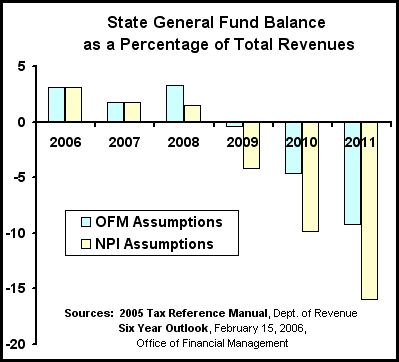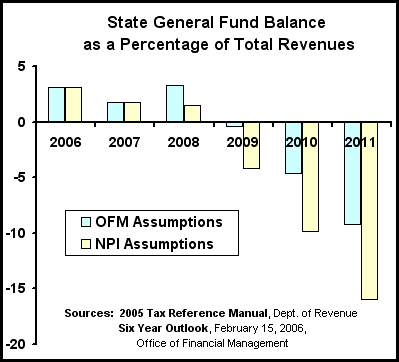
Last week we reported the grim side of the state's new Six Year Outlook and presented the following chart regarding the mid-term prospects for the state's finances.
For NPI's guess, I used an arcane construction of rolling weighted averages of the state's big three taxes: Property, Sales and B&O. And I said I would be asking the state's Office of Financial Management (OFM) to define why their projection of 5% growth in revenues after 2009 and five-plus in some intervening years is reasonable.
I have the response back from the state. You may want to shield your eyes if technical details are an anathema to your brain's smooth operation.
Irv Lefberg, Chief of Forecasting, Office of Financial Management, sez:
The basis for the 5% revenue growth assumption after 2009 is as follows
Annual long term population growth forecast = 1.3%
Annual long term inflation forecast = 2.5%
Annual real per capita income forecast (productivity) = 2.0%
TOTAL PERSONAL INCOME GROWTH FORECAST = 5.8%
(sum of above three components)
Rate of revenue growth as percent of personal income growth (revenue elasticity) = 90% (historical average)
Revenue growth = Elasticity X Personal Income growth = 5.8% x 90% = 5.2%. We rounded it down to 5% for the six year outlook.
Please note that the revenues referenced in the six year outlook are General Fund State revenues only. Federal revenue is not part of the projection. [Which eliminates my conjecture that federal moneys were part of the strong growth assumption - a.]Historically major taxes have growth faster than 5% annually.
The official state economic and revenue forecast for the 2007-09 Biennium, produced by the Economic and Revenue Forecast Council, assumes a slowdown in the housing market. Including the slowdown, they also forecast revenue to grow at about 5% annually.
Please call me if you have additional questions.
I will be calling you, Irv, because there's some difficulties.
The historical average of taxes over the ten years 1995-2004 (which I used, since they were at hand in the Tax Reference Manual) was not 5%, but significantly below 5%. To wit, 4.1 for Sales, 3.5 for B&O, and 3.6 for Property. While Sales is twice as important as the other two combined, 4.1 is not 5, and the last time even the Sales Tax saw plus-five was in 2000. Beyond this, the Eyman initiatives have cut us off from historical trends, so looking backward at them now is a bit like looking through the rear window when you're driving. Not safe.
Second, while personal income is a good thing to mark from if you have a personal income tax, we don't, and we are not likely to get one soon, so maybe we'd better use something that tracks our kind of tax system better, like median income. Median income is stagnating, even while total personal income is going up, because a few at the top are doing very, very well. ["Revenue elasticity" seems to be "kinda" term. It's kinda close. Maybe it's standard. Irv would know better.]
Thirdly, the 2.5 percent inflation. We have no idea what inflation will be. It depends on energy prices, Fed policy, and whether the rest of the world will keep treating us nice. Wouldn't it be better to just figure things out in real (inflation-adjusted) terms, since inflation is built in to both expenditures and revenues? Unfortunately, we don't do it that way. I need to ask Irv about that. But in OFM's balance sheet, we seem to assume different things with regard to inflation depending on which side of the ledger we're on. On the Expenditures side we assume 2% adjustments for state employee COLAs. On the Revenues side, according to Mr. Lefberg, we're hoping for 2.5%. Nice work if you can get it. Point five percent can be $75 million or more a year.
There's more, of course, but what is fascinating to me is like filling one's head with cement to others. I'm trying to liven it up by throwing chairs at Irv, but witnessing disputes between economists always end up like watching fish wrestle.





